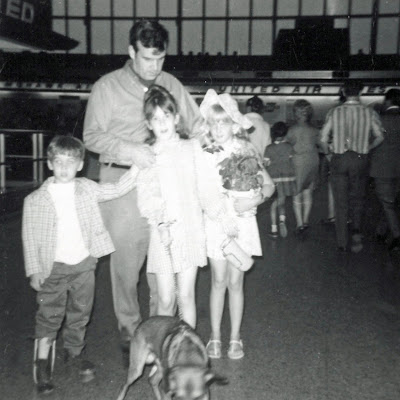
For a time during my early childhood my father would tuck me and my siblings in at night by telling us an installment of this never-ending tale he apparently made up on the spot about a brave lad named Agazzi and his trusty canine companion --whose name, sadly, I’ve forgotten. Our two heroes faced many daring adventures, the far-fetched plot twists equally doused in tragedy and triumph; and always a dramatic cliff-hanger at the end, which left my brother, sister and I dangling in tantalizing thoughts as we drifted off to sleep…
According to the late, great, computer wiz Steve Jobs, “the storyteller is the most powerful person in the world” because, as Jobs saw it, “the storyteller sets the vision, values, and agenda of an entire generation to come.”
The art of storytelling is something I am grateful to say I was weaned on and which I have tried to pass on to my children and grandchildren. But regretfully, the tales of Agazzi --a long since faded childhood memory--were laid to rest back in 1990 when Dad left us far too early. My brother likens the loss of Agazzi to the missing plays of Sophocles -- which is perhaps a tad dramatic, except that it does feel on a personal level like a glorious family treasure has indeed slipped through our fingers forever.
Such was the riveting manner in which we huddled closely on one or another’s bed to anxiously await each chapter our master storyteller would gin up for us fresh from his own imagination. Such was the bond created over 50 years ago as my brother, sister and I willingly gave ourselves over to the bedtime journey, replete with its subtle lessons on the value of persistence, the importance of belief in one’s self, and, ultimately, our unflinching faith in the power of goodness to triumph over evil.
Where are our storytellers today? In a world when too often principles are transactional and truth is negotiable, we need more storytellers to -- as Hamlet puts it --“hold a mirror up to nature.” My recent experiences at two local theatres --first to see the documentary “Obit: Life on Deadline” at Newburyport’s Firehouse Center for the Arts, and then to hear master storyteller, Jay O’Callahan, perform as part of Gloucester Stage Company’s “Never Dark” series -- have convinced me of this truth now more than ever.
Told in cinéma vérité style, “Obit” captures a day in the life of obituary writers from the New York Times as they attempt to memorialize (in 800 words or less) lives that have impacted our contemporary culture in one way or another - from Michael Jackson, David Foster Wallace, and Leonid Brezhnev to lesser known actors on the world stage --the inventor of the Slinky or the ad man responsible for those quirky Alka Seltzer commercials from the 1960s.
Film maker Vanessa Gould convincingly makes the case that the obit writer is a unique kind of storyteller tasked with explaining “how the world got to be the way it is,” prompting readers to find connections with strangers through the very things that bind us as human beings --the fragility of our mortal coil, the need to be known, the desire to live a life that mattered --in one way or another.
Obit writer William Grimes describes what he does as “weaving a historical spell and enchanting the reader and doing justice to a life… It’s a once-only chance to make the dead live again.” After all, only a sentence or two of an obituary is dedicated to the person’s death - -the rest is a valediction of contributions made to the world of the living. As storyteller, Grimes is empowered to decide what about a person’s life is worth remembering and retelling and underlining in red ink forever after.
Using the oral tradition, O’Callahan also holds the mirror up to his audiences. With masterful expressions, physicality, cadence, and language, he kept us spellbound as he shared the humor and drama of ordinary life as a young boy growing up during WWII in a working class Boston neighborhood. There is an authenticity about O’Callahan’s craft that rises beyond mere facts, leading to the kind of truths I was still pondering long after leaving that intimate seaside theatre --about how our love for the people in our lives transcends their transgressions; how our imperfections are worth celebrating because they are woven into the fabric of who we are; how finding the good in people can be just as contagious as looking for the flaws and differences…
I once read about a study on the workings of the human brain in relationship to language. Words like “cinnamon,” “lavender,” and “soap” -- the study suggested- not only trigger the language-processing areas of our brains, but also light up the sensory cortex areas; just as words like “kick,” “jump”, and “haul” ignite the brain’s motor cortex. Scientists concluded that this ability of language to affect multiple sections of our brains is probably why humankind has always connected at such a visceral level to a well-told tale. Our ability to unite with one another through storytelling has forever been a fundamental part of what makes us human. It probably explains why storytelling is considered “the most human and ancient of art forms.”
As I huddle close around the campfire these days I’m yearning for those tales as old as time to help calm the chaos; the stories that teach us to embrace our flaws as we celebrate our differences; the stories that remind us of our fundamental truths and collective values; the ones that restore our faith in the power of goodness to heal the world for future generations of lads and lassies-- and their trusty canine companions.
Now more than ever, we need our storytellers to show us the way. What stories do you have to tell?



No comments:
Post a Comment